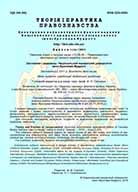Незалежність та неупередженість суду як складові верховенства права у цивільному судочинстві
Іndependence and impartiality of the court as elements of rule of law in civil procedure
Author(s): Tetiana TsuvinaSubject(s): Civil Law, Human Rights and Humanitarian Law
Published by: Національний юридичний університет імені Ярослава Мудрого
Keywords: independence of the court; impartiality of the court; rule of law; right to a fair trial; Convention for the Protection of Human Rights and Fundamental Freedoms; European Court of Human Rights;
Summary/Abstract: The article is devoted to the analysis of the independence and impartiality of the court as constituting elements of the rule of law in civil procedure. The author concludes that it is necessary to interpret the concepts of independence and impartiality of the court through the prism of par. 1Art. 6 of the Convention for the Protection of Human Rights and Fundamental Freedoms, which enshrines the right to a fair trial in civil matters, and the practice of the European Court of Human Rights regarding the interpretation and application of this article. According to par. 1 art. 6 ECHR in determination of his civil rights and obligations everyone is entitled to a fair and public hearing within a reasonable time by an independent and impartial tribunal established by law. At first glance ECHR doesn’t regulate jurisdictional issues. However, conflict of jurisdictions problem should be analyzed in terms of such elements of the right to a fair trial as access to court and«court, established by law».Criteria of independence and impartiality of the court are examined in the context of the practice of the European Court of Human Rights. The main criteria for the independence of judges are: a) the method of judges’ appointment; b) the duration of their term of office; c) the availability of guarantees against external influences; d) the presence of external attributes of independence.The impartiality of the court is analyzed in terms of subjective and objective criteria. Based on the analysis of the norms of the national civil procedural legislation, it is concluded that it does not fully reflect the international standards of fair trial in terms of ensuring the institutional requirements for the independence and impartiality of the court.Particular attention in this context is also should be paid to a critical assessment of the proposed changes to the Civil Procedure Code of Ukraine regarding motion for recusal of the judge in accordance with the Draft Law of Ukraine «On Amendments to the Commercial Procedure Code of Ukraine, the Civil Procedure Code of Ukraine, the Code of Administrative Procedure of Ukraine regarding improvement reviewing court decisions on appeal and cassation proceedings»№ 2314 of October 25, 2019. The proposed innovations are critically evaluated because of the fact that possibility to rule on the motion for the recusal of the judge by the same judge who is considering the case does not comply with the legal axiom «nemo judex in re sua» («no one can be a judge in his own case»).
Journal: Теорія і практика правознавства
- Issue Year: 2/2019
- Issue No: 16
- Page Range: 1-10
- Page Count: 10
- Language: Ukrainian

